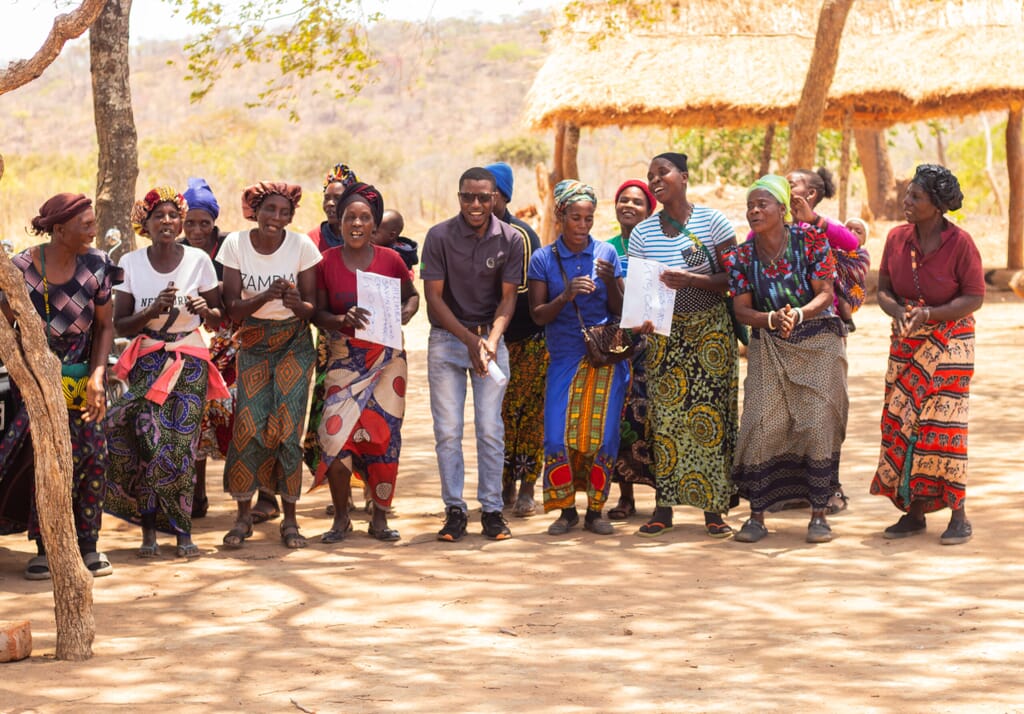In the heart of Rufunsa District, Bunda Bunda Chiefdom is proving that climate action and community empowerment go hand in hand. Through its partnership with the Lower Zambezi REDD+ Project (LZRP), the Chiefdom is demonstrating how revenue from forest conservation can be reinvested in life-changing local initiatives, creating a ripple effect of opportunity, resilience, and sustainability.
Turning Carbon Revenue into Community Empowerment
Under BCP’s REDD+ model, communities that protect their forests receive carbon fees. Funds allocated to the communities are managed transparently through Community Forest Management Groups (CFMGs), which identify priorities through local needs assessments.
In 2024, Bunda Bunda Chiefdom decided to channel part of its carbon fees into an innovative and community-driven financial model — Village Savings Groups (VSGs). Two zones, Mweshangombe and Chilimba, were selected to pioneer the initiative. Together, they have established five savings groups (three in Mweshangombe and two in Chilimba), each receiving K10,000 in start-up capital.
These savings groups are more than financial cooperatives; they are platforms for empowerment, social cohesion, and economic independence.

The Power of Village Banking
Village banking, also known as Village Savings and Loan Associations (VSLAs), is a community-based microfinance model that allows members — often women and smallholder farmers — to save money together, lend to one another, and collectively invest in income-generating activities.
According to FINCA Zambia and CARE International, VSLAs have become one of the most effective tools for rural poverty reduction in sub-Saharan Africa, enabling families to build assets, access credit, and weather economic shocks. In Zambia, where formal banking services remain out of reach for much of the rural population, village banking provides a safe, transparent, and empowering alternative.
For women in particular, VSLAs are transformative. They provide access not only to financial resources but also to decision-making power, helping women to invest in small enterprises, education, and improved household wellbeing.
From Forest Protection to Financial Inclusion
The Bunda Bunda Village Savings Groups embody the REDD+ principle of “conservation through community benefits.” By investing their carbon revenue into sustainable finance models, communities are creating the means to reduce dependency on forest-based livelihoods such as charcoal production or timber harvesting.
Each group is expected to fund household and small business ventures, from farming and tailoring to small-scale trading, providing a reliable income stream throughout the year. Over time, this creates a positive cycle: as households become more financially secure, pressure on nearby forests decreases, further enhancing the success of conservation goals.
Real Impact, Real People
In total, 100 households across Mweshangombe and Chilimba Zones will directly benefit from the savings groups, with indirect benefits extending to hundreds more through community investments and shared knowledge.

Community members describe the initiative as a “turning point.” For many, this is the first time they have access to structured financial tools and collective decision-making. The ability to save, borrow, and invest has opened the door to education, healthcare, and food security.
The Broader Picture: Carbon Finance Driving Local Development
Zambia remains one of the most forested countries in Africa, but it also faces one of the highest deforestation rates, estimated at around 155,000 hectares per year according to the FAO’s Global Forest Resources Assessment (2020). Much of this loss is driven by poverty-related activities such as charcoal production, agricultural expansion, and unsustainable resource use.
By reinvesting carbon revenue into local initiatives like village banking, BCP and its partner Chiefdoms are addressing the root causes of deforestation, economic insecurity, and lack of livelihood options, while empowering communities as active agents of climate resilience.
A Model for Sustainable Futures
The Village Savings Group initiative in Bunda Bunda Chiefdom is more than a financial project; it is a model of what happens when climate finance meets community trust. It shows how equitable, transparent, and locally-led investment can turn global climate goals into real, measurable impact on the ground.
With each saving, loan, and small investment, the people of Bunda Bunda are not only improving their own lives but also helping to secure Zambia’s forests for generations to come.
Related Articles
